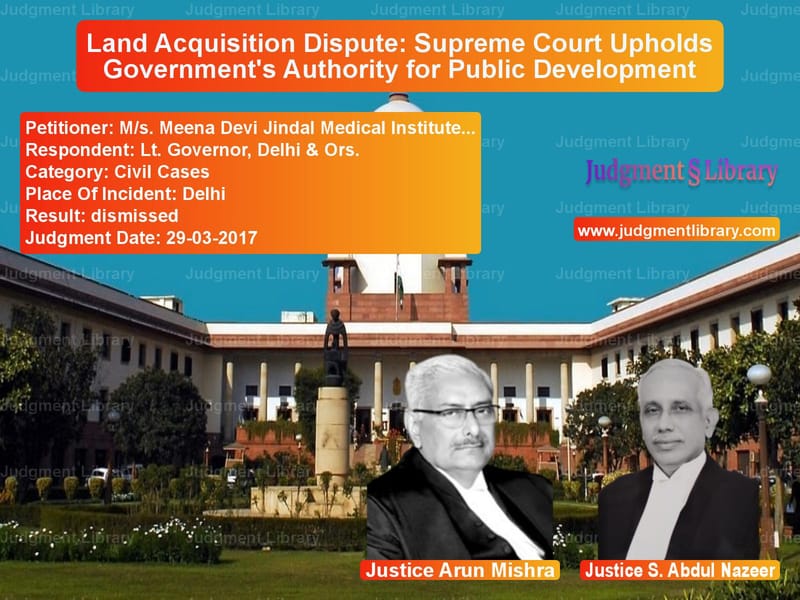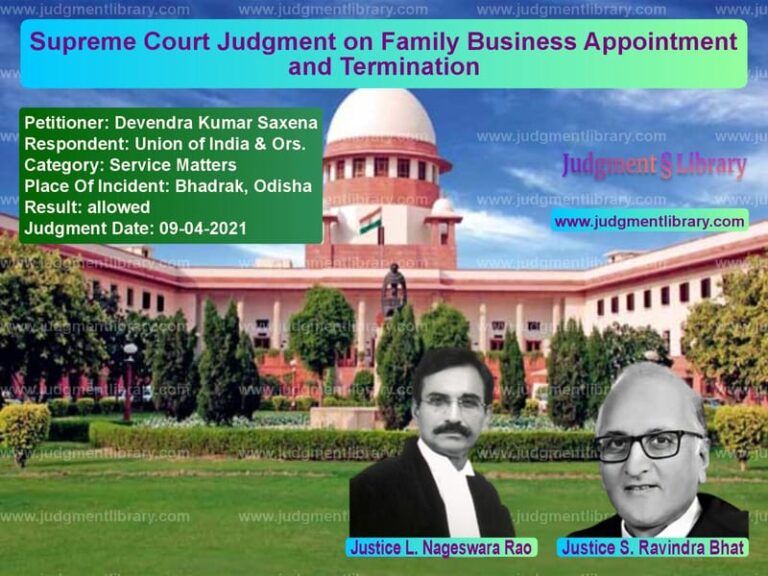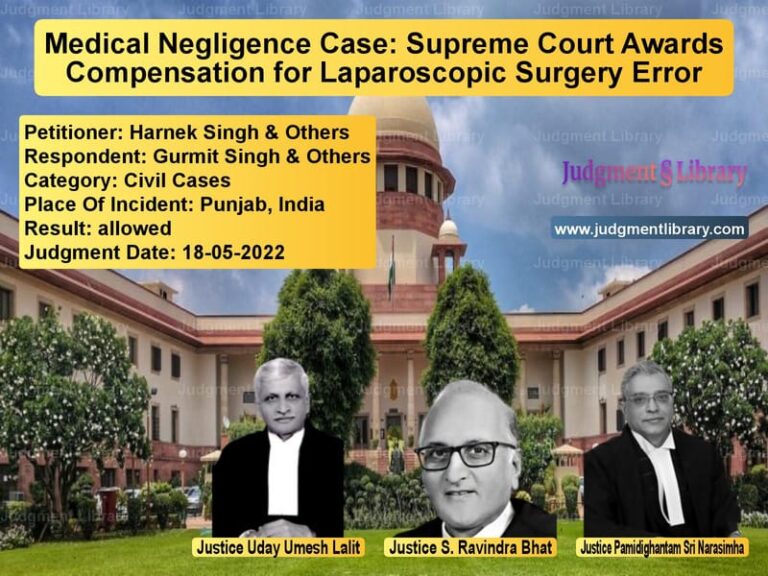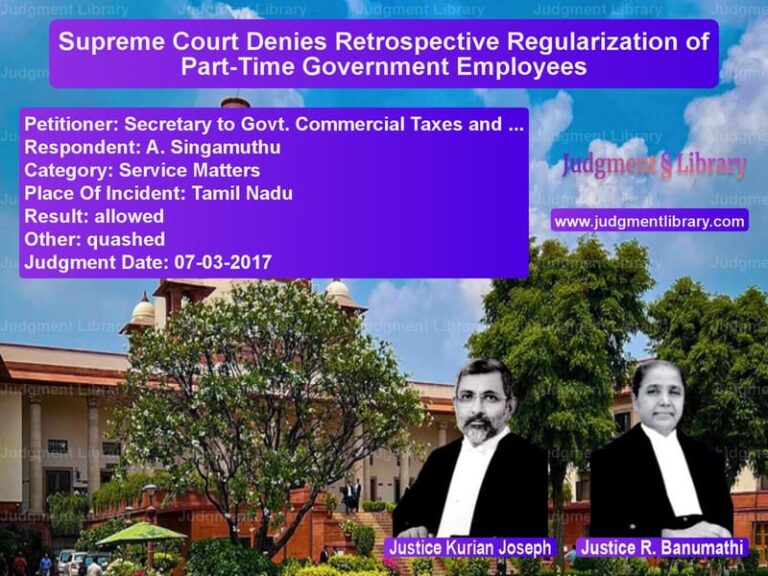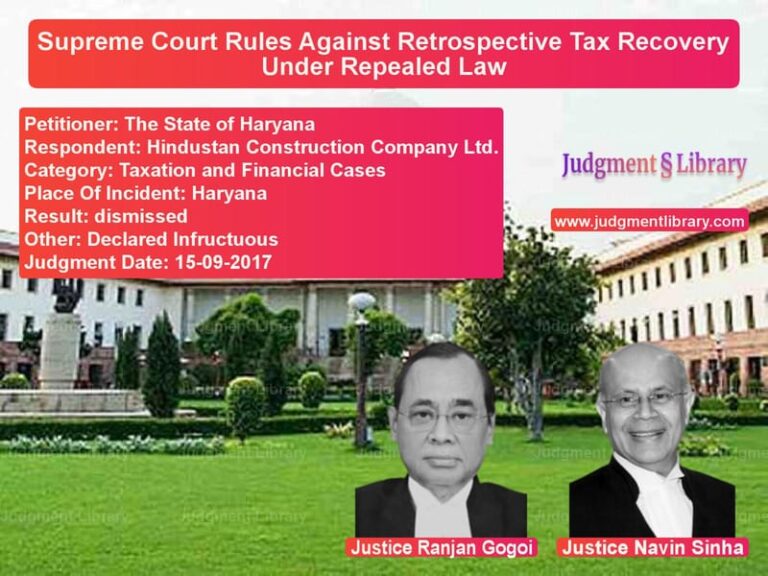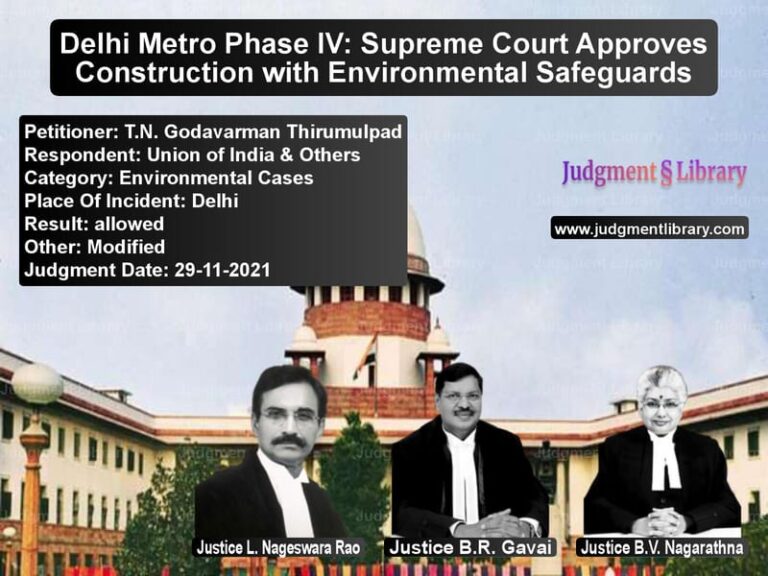Land Acquisition Dispute: Supreme Court Upholds Government’s Authority for Public Development
The case of M/s. Meena Devi Jindal Medical Institute & Research Centre vs. Lt. Governor, Delhi & Ors. is a significant judgment concerning land acquisition in Delhi. This case revolves around whether the acquisition of land by the government for institutional purposes was legally valid and whether the petitioner, a medical institute, had grounds to challenge the acquisition on the basis of public purpose and procedural lapses.
The Supreme Court examined whether the acquisition process followed legal mandates, whether the rejection of objections was valid, and whether the land’s proposed use was indeed in the interest of public development. The judgment ultimately reaffirmed the government’s authority to acquire land for planned urban development.
Background of the Case
The dispute dates back to 1982 when the appellant, M/s. Meena Devi Jindal Medical Institute & Research Centre, challenged the acquisition of its land under the Land Acquisition Act, 1894. The notification for acquisition was issued on March 19, 1981, under Section 4 of the Act, followed by an enquiry under Section 5A and a declaration under Section 6.
The appellant argued that the land was meant for philanthropic purposes, primarily for establishing a hospital. However, the Delhi government acquired it for institutional purposes, stating that it was required for a school. The acquisition was part of the planned development of Delhi, as outlined in the city’s zoning regulations.
Petitioner’s Arguments
The appellant, through its legal counsel, contended the following:
- The notification for acquisition lacked specificity regarding the purpose of acquisition.
- The rejection of objections under Section 5A of the Land Acquisition Act was arbitrary and violated due process.
- The land was already being used for a medical institution, which should have been considered a valid public purpose.
- The government had alternative land available for setting up a school, making this acquisition unnecessary.
- The delay in acquisition proceedings caused undue hardship to the appellant.
Respondent’s Arguments
The government of Delhi, represented by its counsel, argued the following:
- The acquisition was part of the broader planned development of Delhi, which is recognized as a public purpose under Section 3(f) of the Land Acquisition Act.
- The land in question was designated for institutional use in the city’s master plan.
- The objections raised by the appellant were duly considered and rejected based on the public interest involved.
- Educational institutions play a crucial role in societal development, and acquiring land for such purposes is a legitimate exercise of state power.
- The appellant’s lease agreement with the original owner did not confer absolute ownership rights, and the acquisition was valid under the law.
Legal Analysis by the Supreme Court
The Supreme Court examined the following key legal issues:
1. Validity of Acquisition Process
The Court scrutinized whether the acquisition process complied with the requirements of the Land Acquisition Act, 1894. It found that:
- The notification under Section 4 was properly issued.
- The enquiry under Section 5A was conducted, and objections were considered before being rejected.
- The Section 6 declaration was within the prescribed legal time frame.
The Court ruled that procedural requirements were met, thereby upholding the acquisition.
2. Public Purpose Justification
The appellant contended that its land was already serving a public purpose as a medical institution. However, the Court emphasized that planned urban development, including the establishment of schools, falls within the domain of public interest.
“The acquisition is for public purpose. In our opinion, there was no vagueness in the notification. It could not be said that particular property has been plucked out as there is no allegation of any malafide attributed in the matter of acquisition.”
3. Rights of the Appellant
The appellant argued that its leasehold interest should be protected. The Court, however, clarified that leaseholders do not enjoy the same rights as freehold property owners and that state policy decisions regarding land use take precedence over individual lease agreements.
4. Delay in Acquisition
While the appellant highlighted delays in the execution of the acquisition process, the Court found that such delays did not automatically render the acquisition invalid unless malafide intent was proven. Since no such allegations were substantiated, the acquisition was upheld.
Supreme Court’s Final Judgment
The Supreme Court dismissed the appellant’s plea, ruling in favor of the Delhi government. The key holdings of the judgment included:
- The acquisition was legally valid and met all procedural requirements.
- The establishment of educational institutions qualifies as a legitimate public purpose under the Land Acquisition Act.
- The appellant’s leasehold rights did not override the government’s authority to acquire land for public use.
- Delays in proceedings did not justify setting aside the acquisition.
Implications of the Judgment
This ruling has significant implications for property rights and urban development policies:
- Clarifies Public Purpose: The judgment reinforces the principle that planned urban development is a valid justification for land acquisition.
- Strengthens Government Authority: It upholds the government’s right to acquire land for institutional purposes, such as schools, even if the existing use also serves a public function.
- Limits Leasehold Protections: Leaseholders cannot use their agreements to challenge acquisitions carried out in the public interest.
- Sets a Precedent: The ruling provides guidance on similar disputes, where individuals challenge acquisitions on procedural and public purpose grounds.
Conclusion
The Supreme Court’s decision in M/s. Meena Devi Jindal Medical Institute & Research Centre vs. Lt. Governor, Delhi & Ors. upholds the principle that state-led land acquisitions for planned development serve larger societal interests. While private parties may challenge such acquisitions, courts will prioritize urban planning and educational infrastructure needs when determining public purpose.
This case serves as a reminder that while individual property rights are protected, they must be balanced against the need for structured urban development and public welfare.
Don’t miss out on the full details! Download the complete judgment in PDF format below and gain valuable insights instantly!
Download Judgment: Ms. Meena Devi Jind vs Lt. Governor, Delhi Supreme Court of India Judgment Dated 29-03-2017.pdf
Direct Downlaod Judgment: Direct downlaod this Judgment
See all petitions in Property Disputes
See all petitions in Landlord-Tenant Disputes
See all petitions in Specific Performance
See all petitions in Judgment by Arun Mishra
See all petitions in Judgment by S. Abdul Nazeer
See all petitions in dismissed
See all petitions in supreme court of India judgments March 2017
See all petitions in 2017 judgments
See all posts in Civil Cases Category
See all allowed petitions in Civil Cases Category
See all Dismissed petitions in Civil Cases Category
See all partially allowed petitions in Civil Cases Category

